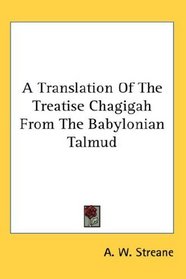Search -
A Translation Of The Treatise Chagigah From The Babylonian Talmud
A Translation Of The Treatise Chagigah From The Babylonian Talmud
Author:
Purchase of this book includes free trial access to www.million-books.com where you can read more than a million books for free. This is an OCR edition with typos. Excerpt from book: GLOSSAEY. Baraitha (NFIJ13, pi. nin3) denotes a law or principle extraneous 03, N13, = outside) to the Mishnah, in other words, one which was not included in ... more »
Author:
Purchase of this book includes free trial access to www.million-books.com where you can read more than a million books for free. This is an OCR edition with typos. Excerpt from book: GLOSSAEY. Baraitha (NFIJ13, pi. nin3) denotes a law or principle extraneous 03, N13, = outside) to the Mishnah, in other words, one which was not included in ... more »
ISBN-13: 9780548076965
ISBN-10: 0548076960
Publication Date: 7/25/2007
Pages: 184
Rating: ?
ISBN-10: 0548076960
Publication Date: 7/25/2007
Pages: 184
Rating: ?
0 stars, based on 0 rating
Publisher: Kessinger Publishing, LLC
Book Type: Hardcover
Other Versions: Paperback
Members Wishing: 0
Reviews: Amazon | Write a Review
Book Type: Hardcover
Other Versions: Paperback
Members Wishing: 0
Reviews: Amazon | Write a Review




